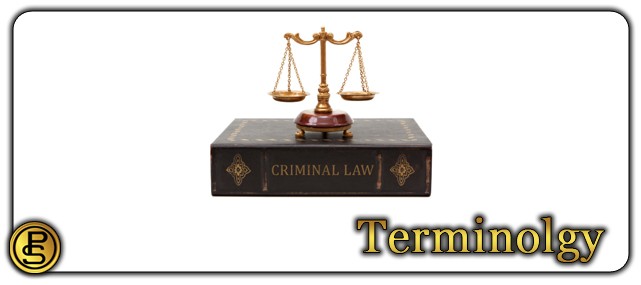Colorado Legal Terms Defined by Attorney Philip M. Smith
Philip M. Smith • Attorney • Denver, Colorado
Denver Colorado Criminal Defense Lawyer
Free Consultations • Call (303) 333-8900 • Email
Common Legal Terms in Criminal Law
–A–
Acquittal: The verdict of not guilty for a defendant in a criminal case.
Adjudication: A finding by the court that a juvenile has committed a delinquent act or that the complaint/petition is proven.
Advisement: The consultation of the court, after the argument of a cause by counsel, and before delivering an opinion.
Arraignment: The formal act of calling the defendant into open court, informing him or her of the offense charged, and the defendant’s entry of a plea to the charge.
Arrest warrant: A written order from a judge which commands law enforcement to arrest a person and bring before a judicial officer.
Attorney of Record: Refers to the current licensed attorney representing an individual in a legal matter.
–B–
Bail, Bail bond: The release of arrested or imprisoned persons when security, cash, or property is given or pledged to ensure their appearance in court at a specified date and place. The most common bond is a surety bond in which bail is guaranteed by a commercial bondsperson.
Bench warrant: An order issued by a judge for the arrest of a person, typically for failure to appear in court.
Bind over or bound over: After a hearing in County Court to determine if there is probable cause to believe that the defendant committed the charged offense, the case is transferred to District Court. There the defendant is arraigned. That is a formal advisement of the charges and enter of a plea of not guilty or a guilty–usually pursuant to a plea bargain.
Bond: In criminal law, an undertaking, with or without sureties or security, entered into by a person in custody by which he or she binds himself/herself to comply with the conditions set by the court. If the conditions are violated, the bond will be forfeited and the defendant taken into custody.
Booking or Booked: The process in which law enforcement acquires personal information, fingerprints for public record as a result of an arrest or “turning oneself in”. Booking can take up to six or seven hours.
–C–
CBI: Abbreviation for “Colorado Bureau of Investigation”.
Circumstantial evidence: All evidence of an indirect nature that implies something occurred but does not directly prove it.
Citation: An order to appear in court at a certain place at a specified time. Issuance of a citation is not an arrest.
City Attorney: The prosecuting officer representing a municipality.
Community corrections: Public or privately operated community-based programs holding defendants in the community while providing them opportunities to work, attend school, or perform community services. The defendants may be there as part of a sentence or probation, or may be there as a conditional release from imprisonment.
Concurrent sentences: Sentences for two or more crimes may be ordered by a judge to be served simultaneously rather than successively.
Consecutive sentences: Sentences for two or more crimes may be served one after another instead of simultaneously.
Contributory negligence: In any action based upon the negligence of the defendant, the plaintiff’s own contributory negligence may either defeat or reduce the amount of recovery.
Conviction: A finding that the defendant is guilty in a criminal case.
Corroborating evidence: Evidence supplementary to that already given and tending to strengthen or confirm it.
–D–
Defendant: In criminal cases, the person accused of the crime.
Deferred sentence or judgment: An arrangement in which a defendant who pleads guilty is placed on probation for up to two years, usually with conditions. If the defendant successfully completes probation, the guilty plea is withdrawn and the case is dismissed. If the defendant fails probation, he or she may be sentenced based upon the guilty plea.
Determinant sentence: A sentence to confinement for a fixed period as specified by statute.
Discovery: The pre-trial examination of a person or thing to obtain information relevant to the case.
District attorney: Under the state governments, the prosecuting officer who represents the state in each of its judicial districts.
Diversion: Similar to a deferred judgment except supervision is usually by the prosecutor’s office instead of the Probation Department. If the Defendant meets the conditions set by the court, then the charge will be dismissed. Diversion cases that have been dismissed can be Sealed.
DOC: Abbreviation for “Department of Corrections”.
Docket. A schedule of proceedings and cases to be heard on a given date and time in a specific courtroom.
Due process: The Constitution guarantees that the government cannot take away a person’s basic rights to “life, liberty or property, without due process of law.”
–E–
Evidence: The testimony, writings, material objects, or other things presented to the senses that are offered to prove the existence or nonexistence of a fact. The law makes no distinction between circumstantial and direct evidence.
Exigent circumstances: Emergency conditions.
Extradition: The surrender by one state of an individual accused of an offense to another state.
–F–
Felony: A crime punishable by death or by imprisonment in a state penal institution.
Forgery: The false making or material altering, with intent to defraud, of any writing which, if genuine, might be the foundation of a legal liability.
Fraud: Deceitful conduct designed to manipulate another person to give something of value.
Fugitive: One who runs away to avoid arrest, prosecution or imprisonment.
–G–
Grand jury: A panel of members of the public chosen from regular jury pool lists. This panel determines whether there is probable cause to try an accused for a serious crime. Any charges issued by a grand jury are called indictments.
Gross negligence: Failure to use even the slightest amount of care in a way that shows recklessness or willful disregard for the safety of others.
–H–
Habitual offender: Also known as a “recidivist. A person who is convicted and sentenced for crimes over a period of time and even after serving sentences of incarceration, such as demonstrates a propensity toward criminal conduct.
Hearing date: The time, in criminal law, for the trial of a person charged with a crime of misdemeanor.
Hostile witness: A witness who manifests hostility or prejudice against the calling party. On direct examination, the calling party may be permitted to question such a witness as if he or she has been called by the opposing party.
–I–
Immunity: A grant by the court against prosecution in return for providing criminal evidence against another.
Impeach: To attack the credibility of a witness by the testimony of other witnesses or by other evidence.
Indeterminate sentence: An indefinite sentence of “not less than” and “not more than” a number of years, with the exact term to be set by parole authorities. Generally this sentence is imposed for unlawful sexual conduct classified as a Class 4 felony or greater.
Indictment: A written statement, presented by a grand jury to the district court, which charges the commission of a crime by an alleged offender.
Indigent: Meeting certain standards of poverty, thereby, qualifying a criminal defendant for a public defender, waiver of fees and court-appointed counsel.
Infractions: Sometimes called violations. Minor offenses, often traffic tickets, which are punishable only by a fine.
–J–
Jail: A place of detention; a place where a person convicted or suspected of a crime is detained for a short term.
Joint and several liability: Liability of more than one person for which each person may be ordered to pay the entire amount of damages done by all.
Judges, justices, and court: Often used synonymously or interchangeably; however, the lower courts use judges and the distinction of justice belongs to a Supreme Court member by virtue of his/her office.
Judgment: In a criminal case, it includes the pronouncement of guilt and the sentence.
Jurisdiction: Refers to a particular geographic area containing a defined legal authority.
Jury trial: A trial whereby a group of citizens serving as a jury listens to evidence presented in court and gives its verdict.
–K–
Kidnapping: The unlawful taking and carrying away of a human being by force and against his or her will.
–L–
Litigant: A party to a lawsuit, one engaged in litigation usually spoken of active parties.
Litigation: A law suit, legal action, including all proceedings therein.
–M–
Magistrate: Any person other than a judge authorized by statute or by Colorado Rules for Magistrates to enter orders or judgments in judicial proceedings.
Malicious prosecution: An action instituted with intention of injuring the defendant and without probable cause and which terminates in favor of the person prosecuted
Mandate: A command, order or direction, written or oral which court is authorized to give and a person is bound to obey. A judicial command or precept proceeding from a court or judicial officer, directing the proper officer to enforce a judgment, sentence or decree. An order issued upon the decision of an appeal or writ of error, directing action to be taken, or disposition to be made of case, by inferior court.
Manslaughter: The unlawful killing of another without malice; may be either voluntary, upon sudden impulse, or involuntary.
Misdemeanor: A criminal offense punishable by a sentence of two years or less to the county jail.
Mistrial: A trial terminated prior to a verdict as a result of a fundamental error prejudicial to the defendant.
Mitigating circumstance: A circumstance which does not constitute a justification or excuse for an offense, but which may be considered as reducing the degree of moral culpability.
Mittimus: Latin meaning, “we send”. The name of a order issued from the court, directed to the sheriff or other law enforcement commanding him to receive and safely keep such person as listed with the conviction charges and sentence.
Motion: An application for a rule or order, made to the judge.
Municipal courts: Courts confined to the city or community in which they re established.
–N–
Nolo contendere: Latin meaning “I will not defend it”. No contest. A pleading that denies the guilt but admits the facts on which the charge is based. This plea, if accepted by the court, has the same effect as a guilty plea.
Notary public: A person authorized to witness the signing of documents. Notary’s must verify identity of signer cannot verify accuracy and validity of documents.
–O–
Offense: A felony, misdemeanor or petty offense, a breach of criminal law that subjects the offender to imprisonment, and/or fines.
Order: A formal written command from the court directing or forbidding an action.
Ordinance: A written law enacted by the legislative body of a county, township, or city.
–P–
Parole: The release of a person from incarceration from a prison serving a sentence on a convicted crime prior to the expiration of said sentence.
Pedophile: A person whose sexual perversion in which children are preferred as a sexual partner.
Perjury: The criminal offense of making a false statement under oath.
Permanent Protection Order aka Restraining Order (PRO): An order granting continuous protective relief to prevent assaults and threatened bodily harm, to prevent domestic abuse, to prevent emotional abuse of the elderly, and to prevent stalking.
Personal recognizance aka PR Bond: A type of bail consisting of a written promise to appear in court when required. A bond secured only by the personal obligation of the person giving the bond. See Own Recognizance.
Petty offenses: Minor crimes, lesser penalties, which are generally punishable by a small fine or short jail term.
Plea: In criminal cases pleas are not guilty; not guilty by reason of insanity; no contest; and guilty.
Plea-bargaining: The process whereby the accused and the prosecutor negotiate a mutually satisfactory disposition of the case. The defendant may plead guilty to a lesser offense or to only one or some of the charges. In return, the defendant seeks concessions on the type and length of sentence or a reduction of counts charged.
Pleadings: That part of a party’s case in which he/she formally sets out the facts and legal argument which support that party’s position.
Preliminary hearing: A hearing in which a judge or magistrate determines there are sufficient grounds to compel the accused to stand trial. If probable cause is found, a defendant is “bound over” for trial.
Pre-sentence investigation and report: The abbreviation is “PSI”, PSIR. An investigation conducted at the request of the court after a person has been found guilty of a criminal offense. This report provides the court with extensive background information collected by the probation department to determine an appropriate sentence.
Prison: A place of long-term confinement for those convicted of serious crimes.
Pro se: (pronounced pro say) Latin phrase that means “for himself.” A person who represents himself in court alone without the help of a lawyer is said to appear pro se.
Probable cause: Reasonable cause, having more evidence for than against. A reasonable ground for belief in the existence of facts warranting the proceedings complained of.
Probation: The sentence of a court whereby an individual is put under the jurisdiction of a probation officer, rather than incarcerated. Sometimes, a short jail sentence is a condition of probation. It is the most widely used correctional disposition both in Colorado and in the United States.
Prosecutor: A government lawyer who tries criminal cases, typically known as the City Attorney, District Attorney, State’s Attorney or the United States Attorney.
Public Defender: A lawyer employed by the government to represent individuals accused of crimes that cannot afford their own attorney.
–Q–
Quash not squash: A motion presented to the court to overthrow, vacate, annul or void a summons, indictment, subpoena or warrant.
–R–
Restitution: The requirement that an offender provide financial remuneration for the losses incurred by the victim. Always a condition of probation.
Retainer: Refers to the up front payment a client gives a lawyer to accept a case. The client is paying to “retain” the lawyer’s services.
–S–
Search warrant: A court order directing a law enforcement officer to search for and seize any property that constitutes evidence of the commission of a crime, contraband, the fruits of crime or things otherwise criminally possessed; or property designed or intended for use which is or has been used as the means of committing a crime.
Stipulation: An agreement by opposing lawyers on any matter. Most stipulations must be in writing.
Subpoena: An order to a witness to appear and testify at a specified time and place.
Summons: A summons may be issued and served to commence a criminal case in lieu of an arrest warrant. It may be personally served or mailed to the defendant.
Suppression of evidence: A trial judge’s ruling that evidence sought to be admitted should be excluded because it was illegally acquired. A hearing for this is required outside the presence of a jury, often before trial.
–T–
Temporary Protection Order aka Temporary Restraining Order (TRO): An order granted to a protected person without notice or hearing, maintaining the status quo until a it permanent at a hearing. A TPO is not in place until the restrained person is served.
Trial: A judicial examination and determination of facts and legal issues arising between parties in a criminal action.
–U–
Useful Public Service UPS aka Community ServiceWhere the defendant is required to work within the non profit community under the supervision of probation.
–V–
Verdict: The opinion rendered by a jury, or a judge where there is no jury, on a question of fact. A verdict differs from a judgment in that a verdict is not a judicial determination, but is a finding of fact.
Victim Impact Statement: A written statement from the victim detailing how the crime has impacted them. This statement will include a section showing the financial losses of the victim due to the crime, which could ultimately be ordered by the court and recovered as restitution.
Voir dire: Literally “to speak the truth.” The preliminary examination of prospective jurors or witnesses. Such an examination of a witness (outside the presence of a jury) may determine whether evidence is admissible. Pronounced “vwa deer.”
–W–
Waiver: The intentional and voluntary relinquishment of a legal right, as in waiver of speedy trial.
Warrant: An order issued by a judicial officer of a court of record directed to any peace officer commanding the arrest of the person named or described in the order.
Writ: An order issued from a court requiring the performance of a specified act, or giving authority to have it done. To move an inmate from one jurisdiction to another.
Contact My Law Office if you need a criminal defense lawyer to fight an assault criminal charge, or if you have questions about criminal charges and sentencing, I encourage you to contact me, Assault Attorney Philip M. Smith, 303-333-8900 today for a free and confidential initial consultation.










